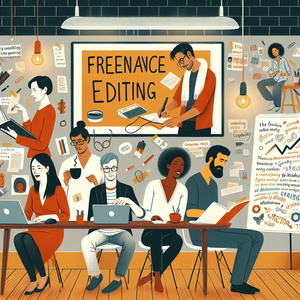
Launching Your Freelance Editing Career: 20 Opportunities and Key Strategies for Success
Embarking on a freelance editing career offers a compelling pathway for those interested in the publishing and media sectors, often without requiring formal degrees or extensive experience. The digital age has opened up numerous avenues for aspiring editors to build their skills, network effectively, and find job opportunities that align with their interests. A strong portfolio, proficiency with editing tools, and an understanding of various style guides are crucial for attracting potential clients. While some experts suggest starting with internships or traditional positions to gain experience, others advocate for jumping straight into freelancing via platforms like Upwork or Fiverr. This article will delve into various freelance editing roles, providing insights into the skills and strategies necessary for success in each area. We’ll also share actionable tips to help you navigate common challenges, explore potential earnings, and identify growth opportunities in the field.
Job Summaries:
Freelance Copy Editor:
- Copy editors enhance clarity, grammar, and adherence to style guidelines across various written materials, from articles to marketing content.
- Key skills include attention to detail, familiarity with style guides (like AP or Chicago), and proficiency in editing software.
- Building a diverse portfolio is essential to showcase your capabilities.
- This role fosters relationships with clients from different industries, providing a broad range of experiences.
Content Editor:
- Content editors work with writers to refine ideas and structure.
- Ensuring that the material resonates with target audiences.
- Knowledge of SEO and digital marketing trends is beneficial.
- While formal education isn't mandatory, having a background in content creation can be a plus.
- This role is vital for enhancing the quality of content across various platforms.
Proofreader:
- Proofreaders focus on identifying typographical errors and formatting issues.
- Requires a solid grasp of grammar and attention to detail.
- Formal qualifications are not typically necessary.
- Specialized training can be advantageous.
- This role often serves as an excellent entry point for newcomers to the editing field.
Developmental Editor:
- Developmental editors provide comprehensive feedback on manuscripts.
- They help authors enhance storytelling and structure.
- Strong communication skills are valuable in this role.
- Editing experience is also important.
- This role is crucial for authors aiming to produce high-quality work.
Academic Editor:
- Academic editors ensure clarity and adherence to academic standards in scholarly articles and research papers.
- Familiarity with citation styles (like APA or MLA) is essential.
- Although a degree can enhance credibility, many academic editors come from writing or tutoring backgrounds.
- This is a rewarding option for those passionate about academic communication.
Substantive Editor:
- Substantive editors focus on the content and structure.
- Ensuring alignment with the author’s voice and intentions.
- Experience in writing or editing is beneficial.
- Familiarity with specific genres can enhance effectiveness in this position.
Online Editorial Assistant:
- Online editorial assistants support the management of digital content.
- Including proofreading and scheduling posts.
- This role often does not require formal education.
- Making it an ideal entry-level opportunity for those interested in digital media.
Video Editor:
- Video editors create polished products from raw footage.
- Proficiency in editing software like Adobe Premiere Pro is necessary.
- A formal degree isn't always required.
- A strong portfolio showcasing past work is essential.
Freelance Book Editor:
- Freelance book editors assist authors in refining manuscripts through developmental editing, copy editing, or proofreading.
- Strong writing skills and attention to detail are critical.
- Networking can greatly enhance career prospects in this niche.
Social Media Content Editor:
- These editors craft engaging content for platforms like Facebook and Instagram.
- Requiring a solid grasp of audience engagement strategies.
- Experience in content creation or marketing is beneficial.
- This role is essential for brands looking to strengthen their online presence.
Script Editor:
- Script editors refine scripts for various productions
- Focusing on dialogue and character development
- A deep understanding of storytelling is crucial
- Strong writing skills are crucial in this creative role
Technical Editor:
- Technical editors review documents on complex subjects, ensuring clarity and accuracy.
- A relevant background and strong editing skills are typically required to make intricate information accessible.
Marketing Copywriter and Editor:
- These professionals create promotional content and ensure it aligns with brand messaging.
- Strong writing skills and an understanding of marketing principles are essential for success in this role.
Freelance Resume Editor:
- This role involves crafting compelling resumes and cover letters for job seekers.
- Familiarity with job market trends and effective presentation techniques can significantly enhance your ability to help clients.
Podcast Editor:
- Podcast editors edit audio recordings to produce polished episodes.
- Proficiency with audio editing software is necessary.
- Experience in production can be beneficial.
- This field is increasingly popular.
E-Learning Content Editor:
- E-learning content editors enhance educational materials for online courses.
- Ensuring clarity and engagement.
- Familiarity with instructional design principles can be advantageous.
Translation Editor:
- Translation editors ensure accuracy and cultural relevance in translated documents.
- Fluency in multiple languages and a strong understanding of cultural nuances are essential for this role.
Brand Editor:
- Brand editors oversee content that aligns with a company’s brand identity.
- Requires strong communication skills.
- Requires an understanding of branding principles.
Journal Editor:
- Journal editors manage the publication process for academic journals.
- Strong writing skills and familiarity with publishing processes are essential for this role.
- This role is vital for advancing scholarly communication.
SEO Content Editor:
- SEO content editors optimize website content to improve search rankings
- Require proficiency in keyword research
- Familiarity with SEO tools
Freelance editing presents an abundance of opportunities for those willing to learn and adapt. By exploring various roles, developing a robust portfolio, and employing effective networking strategies, aspiring editors can successfully navigate the diverse landscape of freelance work. Whether your interest lies in copy editing, academic editing, or content creation, each position offers a unique pathway to a rewarding career. Start your journey today by exploring job openings on popular freelance websites and industry-specific platforms. Remember, the road to success in freelance editing is paved with continuous learning and networking, so embrace the journey!
Explore More Jobs

